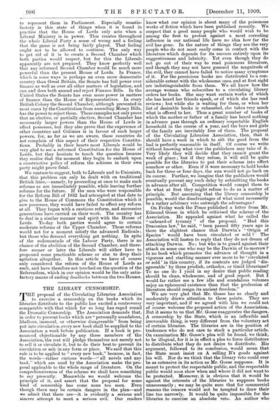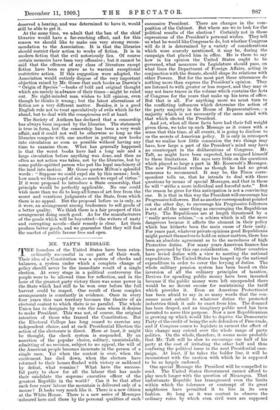THE LIBRARY CENSORSHIP.
TI1E proposal of the Circulating Libraries Association to exercise a censorship on the books which its libraries distribute to the public has excited a controversy comparable with that which for so long has raged round the Dramatic Censorship. The Association demands that, in order to prevent books which are " personally scandalous, libellous, immoral, or otherwise disagreeable" from being put into circulation, every new book shall be supplied to the Association a week before publication. If a book is pro- nounced objectionable by any three members of the Association, the rest will pledge themselves not merely not to sell it or circulate it, but to do their best to prevent its circulation or sale in any form or place. We said that this rule is to be applied to "every new book," because, in fact, the words—rather curious words—" all novels and any book," which are used by the Association make the pro- posal applicable to the whole range of literature. On the comprehensiveness of the scheme we shall have something to say presently. Meanwhile we would welcome the principle of it, and assert that the proposal for some kind of censorship has come none too soon. Even though there may be certain dangers in the plan—and we admit that there are—it is evidently a serious and sincere attempt to meet a serious evil. Our readers• know what our opinion is about many of the poisonous works of fiction which have been published recently. We suspect that a good many people who would wish to be among the first to protest against a most corroding influence in our national life have no ides, how far the evil has gone. In the nature of things they are the very people who do not most easily come in contact with the literature which depends for its success entirely upon its suggestiveness and lubricity. Yet even though they do not go out of their way to read poisonous literature, and though they may not have guessed the magnitude of the evil, they cannot have failed to notice many symptoms of it. For the pernicious books are distributed to a con- siderable extent with the wholesome ones, and at first sight are indistinguishable from them. We all know how the average woman who subscribes to a circulating library orders her books. She may want certain works of which she has heard her friends speak, or of which she has read reviews ; but while she is waiting for them, or when her list of desirable books is exhausted, she takes very much what is offered to her. Thus a great number of books of which themother or father of a family has heard nothing in advance pass through an ordinary respectable English household in the course of a year, and the boys and girls of the family are inevitably free of them. The proposal of the Circulating Libraries Association, then, that it should have a week in which to sift the good from the bad is perfectly reasonable in itself. Of course we write without knowing what view the publishers may take of it. Very likely they will decide that they cannot grant the week of grace ; but if they refuse, it will still be quite possible for the libraries to put their scheme into effect somehow or other. Even if it were necessary- to hold books back for three or four days, the sun would not go back on its course. Further, we imagine that the publishers would eventually prevent any such delay by submitting the books in advance after all. Competition would compel them to do what at first they might refuse to do as a matter of principle. But assuming that the library censorship is possible, would the disadvantages of what must necessarily be a rather arbitrary veto outweigh the advantages ?
On Friday week the Times published a letter from Mr. Edmund Gosse in which he criticised the scheme of the Association. He appealed against what he called the "unheard-of tyranny" of the proposal. "Had this Draconian law," he said, "been passed fifty years ago is there the slightest chance that Darwin's Origin of Species' would have been circulated or sold ? The Association will hasten to reply that they do not dream of attacking Darwin. No; but who is to guard against their attack on some one who may be the Darwin of to-morrow ? Is no book which promotes the advance of thought in a vigorous and startling manner ever more to be circulated or sold' in this country, if its contents are judged 'dis- agreeable' by three prudish, orthodox, or timid librarians? To no one do I yield in my desire that public reading should be clean, wholesome, and of good report. But I would far rather see a few idle and scandalous volumes enjoy an ephemeral existence than that the profession of literature should resign its ancient freedom."
We are very glad that Mr. Gosse has so clearly and moderately drawn attention to these points. They are very important, and if we agreed with him we could not of course welcome the proposed action of the Association. But it seems to us that Mr. Gosse exaggerates the dangers. A censorship by the State, which is an inflexible and irrevocable thing, is very different from the voluntary act of certain libraries. The libraries are in the position of tradesmen who do not care to stock a particular article. On examination Mr. Gosse's plea will be found, we think, to be illogical, for it is in effect a plea to force distributors to distribute what they do not desire to distribute. His argument, followed to its conclusion, would mean that the State must insist on A selling B's goods against his will. Nor do we think that the library veto could ever be as extensive in its action as Mr. Gosse supposes. It is meant to protect the respectable public, and the respectable public would soon show when and where it did not want to be protected. Moreover, it is obvious that it would be against the interests of the libraries to suppress books unnecessarily ; we may be quite sure that for commercial reasons the censors would not be tempted to draw their line too narrowly. It would be quite impossible for the libraries to exercise an absolute veto. An author who deserved a hearing, and was determined to have it, would still be able to get it.
At the same time, we admit that the ban of the chief libraries would have a far-reaching effect, and. for this reason we should like to make one very strong recom- mendation to the Association. It is that the libraries should restrict their action to works of fiction. It is in modern fiction that the evil notoriously lies. Of course certain memoirs have been very offensive ; but it cannot be said. that the offences of any class of literature except .fiction have been so grave as to warrant exceptional restrictive action. If this suggestion were adopted, the Association would entirely dispose of the very important objection raised by Mr. Gosse that such books as Darwin's "Origin of Species "—books of bold and original thought which are merely in advance of their times—might be ruled out. No right-minded man wishes to kill opinion, even though he thinks it wrong; but the latest aberrations of fiction are a very different matter. Besides, it is a good English rule not to treat speculatively of evils which lie far ahead, but to deal with the conspicuous evil at hand.
The Society of Authors has declared that a censorship has always been imposed by the libraries. The statement is true in form, but the censorship has been a very weak affair, and it could not well be otherwise so long as the libraries compete with one another in putting new books into circulation as soon as possible without having any time to examine them. What has generally happened is that the worst books have had a long sale and a large circulation before anything was done, and then as often as not action was taken, not by the libraries, but by some public-spirited person who put the legal machinery of the laud into motion. Mr. Gosse quotes Milton's splendid words : "Suppose we could expel sin by this means ; look, how much we thus expel of sin, so much we expel of virtue." If it were proposed to introduce a State censorship, that principle would be perfectly applicable. No one could wish more than we do to keep all forms of art free from the secret and vexatious judgments of the State, from which there is no appeal. But the proposal before us is only, as it were, an arrangement among tradesmen to sell goods of a better quality. We think there is a fair prospect of this arrangement doing much good. As for the manufacturers of the goods which will be boycotted—the writers of nasty and corrupting novels—their remedy is clear. Let them produce better goods, and we guarantee that they will find the market of public favour free and open.

























































 Previous page
Previous page